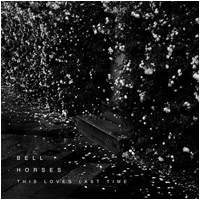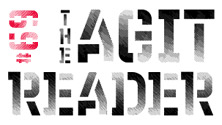
Love 2
Astralwerks
It’s really hard to watch good musicians do bad things. And it’s difficult to imagine what went wrong in the recording of Air’s new album, but something is really, truly wrong here. Is it possible they let imposters into the studio for this one? I had to go back and listen to their last two releases, both of which are sublime (in my humble opinion), just to see if I’m imagining things.
I’m not. Love 2 could very well have been recorded by a different band. Sure, this album has the beeps, the bloops, and that certain layer of sheen that you’d expect from an Air album, but little else. Their best work has narrative structure and actual feeling, not just moods. So, at first, I thought maybe they were trying out some new attitudes, purposefully getting a little more vague, a little more general, just to see if they could find meaning that way. Unfortunately, vague is just a kind way of saying that the album lacks any sort of substance or direction.
Opener “Do the Joy” and its follow-up, “Love,” are about the only tracks that create any real interest, but even still they are just tiny explorations of one or two very mild ideas. “Be a Bee” reaches for some kind of spacey, psych-pop, but like “So Light Is Her Footfall,” it’s painfully repetitive, and even more so given its heavy reliance on kitsch.
What follows are a bunch of songs that sound like they were written on the spot, not composed with time and intention, but made up rather quickly on a computer and “finished” once they bore resemblance to three-minute songs. They all use the same formula—airy backing track, treble filler, hi-hats—to accomplish relatively little. Then you hit “Tropical Disease,” which sounds like the dreck that came out of your 1980s Casio keyboard when you hit the button labeled “demo.” “Night Hunter” at least breaks the pattern, but even being the best track on the album it takes three minutes before it does anything exciting.
Matt Slaybaugh

Fluorescent Black
Big Dada
The music business has become like a horror movie franchise. Even though the main character has “died” everyone expects that they’ll be back and trafficking in mayhem in short order. As a result, the most unexpected band reunions now seem like par for the course. Add to that number the abstract hip-hop group Antipop Consortium. After calling it quits in 2002 after the release of Arrhythmia, the crew has returned from the dead with the contrarily titled Fluorescent Black.
At the time of their disbanding, Antipop had managed to find their sweet spot. After the defiantly fractured full-length debut Tragic Epilogue, the group had found a way to weld their tongue-twisting, fruitcake-dense rhymes to more (relatively) accessible beats. Arrhythmia was a master class in how to reshape the mainstream in your own image. But make no mistake, while the beats had more bounce, they were called Antipop Consortium for a reason.
Fluorescent Black thankfully picks up almost exactly from where Arrhythmia left off. The men of Antipop—Beans, High Priest, M. Sayyid and Earl Blaize—have retained all of the head-scratching lyrical style and brought back some of the more abstract soundscapes of their earlier work. It’s perfect combination of past, present and future. Still, the more things stay the same, the more they change. There are more straightforward lyrical turns, such as the storytelling “Shine,” which seems jarring in the Consortium’s topsy-turvy context. It’s obvious you’re playing with a different set of rules when a song that comes off an updated Slick Rick diatribe is the oddest on the record.
But what’s most unexpected about Fluorescent Black is that it almost plays like a Beastie Boys record. There’s something about how Antipop interacts on record and how they create their own esoteric version of New York hip-hop that when mixed with dry humor seems to echo the Beasties.
Arrhythmia should have been the record to gain Antipop both the critical and popular love that artists like El-P and Aesop Rock had at the time. While that didn’t exactly happen, the equally masterful Fluorescent Black again places them among the elite, no matter how the story ends.
Dorian S. Ham

Psychic Chasms
Lefse
Alan Palomo’s Neon Indian project lies in complete contrast to the glossy populist disco he makes with alter-ego Vega. Anticipated after a few singles caused blogosphere tilt, Psychic Chasms, the Neon Indian debut, is a worthy entry among the class of basement composers deeply rooted in “children of the ’80s” nostalgia. By comparison, Palomo’s the joker. Besides maybe Ultravox, the Human League, and definitely Prince, there’s no real influential equivalent. There are chirping synth trills, beats glazed and crusted, and tones that evoke more of a feeling of Saturday mornings in front of a television. PBS documentary soundtracks, cartoon themes, toy commercials, 8-bit games and Nickelodeon game shows—all seemed to thrive by exaggerating the sophisto pop and keytared new wave. Inside this boogaloo surrealism it’s more just fuzzy memories than intuitive songwriting, but built around strong singles like the breezy, warped “Deadbeat Summer,” the rainbow trails in “Should Have Taken Acid With You,” and the syrup buzz of “Terminally Chill,” the minute-long interludes and half-baked ideas are merely ancillary squiggles and a whole lot of fun. Still, some of these antics ring a bit too ironic, too self-aware. It’s challenging to detect if “Ephemeral Artery” is an inspired slab of street funk or a lucky stab in the dark. Blame (or thank) a similarly home-trained weirdo like Ariel Pink for having no sonic parameters for this kind of disjointed pop. Without the water damage, the sun stroke, the dust bunnies or the sugar highs, though, Psychic Chasms might not juggle the memory as much as it does here. When the music is drowning in this stuff, as it does on “6669 (I Don’t Know If I Know You),” it feels like the first time you heard Scritti Politti, poolside, age 10. Take it or leave it.
Kevin J. Elliott
MP3: “Terminally Chill”

This Loves Last Time
Trysquare
When you take in an impressionist painting, it can be a little overwhelming to digest all of the parts that helped build the whole. I feel the same way about Bell Horses’ debut record, This Loves Last Time. I keep thinking that after enough times I’ll master it and memorize every beat, only to play it again and hear a rush of noises I didn’t notice before. It’s starting to freak me out. But I suppose that was the point of this amoebic side project created by two busy multi-instrumentalists who didn’t actually record together. In essence, it was a sonic pen-pal experiment that was passed back and forth between Berlin, Brooklyn, London, and a converted Victorian church in Western Massachusetts. It’s an even mixture of acoustic and digital sounds spooned into a giant cauldron of whirred vocals. It’s as mellow as it is catchy, and as accessible as it is labyrinthine.
Bell Horses is Xian Hawkins, who records under the Sybarite alias and has performed with Silver Apples, and hot schoolgirl-esque chanteuse Jenny Owen Youngs, who released two solo albums on Nettwerk and gained acclaim for her wry version of Nelly’s “Hot in Herre.” This Loves Last Time shows off their ability to filter guitars, piano, strings and percussion through buzzy, zappy synths and samples. Jenny’s voice is close and crisp, like an American Beth Orton, throughout the rolling melodies of “The Comb” and “Dust Of Us.” Tripped up echoes and distortion in “Headmess” take on a Broken Social Scene, and nearly Radiohead, vibe. Several tracks feature Alexander Ericson (the Northern Territories) on vocals, Michael Lerner (the Antlers) on percussion, and Eve Boltax on classical violin and viola, and the record was mastered by Denis Blackham (Brian Eno, Cocteau Twins) in Scotland. With eight songs adding up to around a half hour, This Loves Last Time would obviously benefit from a few additional cuts. Like electronica’s answer to travelling gnomes or Flat Stanley, it proves that music can thrive under organic yet fragmented circumstances.
Alexandra Kelley

Somewhere Gone
Bloodshot
It’s been a long time since Exene Cervenka’s heyday as a member of the punk band X, but even today, her name seems to evoke memories of the quintessential female front woman. Though she’s been in other bands in the interim (the Knitters and the Blasters) none have been as earthshaking as X. Though the task may be impossible, Cervenka has attempted to make a name for herself aside from the seminal band, and this becomes most obvious after listening to the content of her first truly solo release in almost 20 years (not including her work as part of Exene Cervenka and the Original Sinners), the folk-heavy Somewhere Gone.
Though punk and folk aren’t exactly musical bedfellows, they certainly have their commonalities between them, most notably a simplicity of melody. X was notorious for their ability to turn basic tunes into punk anthems, while still drawing upon musical skill—an advantage that many of their contemporaries did not have. Still, a lot of what made X memorable was Cervenka’s lyricism and intriguingly rough vocals. Granted, her voice may not be most harmonious sound in the world, but smoothness wasn’t necessary in X, and it’s far from compulsory now. Cervenka’s voice on this album projects a rawness there rarely heard these days. She has retained the simple poetics that she brought to X, while at the same time becoming more elaborate in her words with Gone. Cervenka ardently reflects upon the multitude of life experiences she’s collected over the years, and condenses them into 50 minutes of therapeutic honesty. The album is made sentimental by the addition of fiddler/singer Amy Farris, whose masterful, sweeping melodies shine on tracks like “The Willow Tree.” Tragically, though, Farris passed away at the beginning of this month, roughly a week before Gone’s release.
The album as a whole, while predominately of the folk persuasion, certainly does not waste its time quietly lingering in just that genre. Somewhere Gone draws upon a wealth of musical influences: “Pinpoints” is a rhythmic homage to sambas and waltzes of yore, while “Walk Me Across the Night” evokes a syncopated ragtime jazz piano gone rockabilly. There’s a natural progression with this album, as it fluctuates between wittingly sparse and emotionally charged tracks—and the songs are short enough that the bland ones end quickly, and the good ones leave you wanting more. While perhaps not the most exciting album in Cervenka’s repertoire, there’s a strange candor to Somewhere Gone that seems absent on so many albums these days, but all that rawness could be expected from a woman that has covered so many bases. Though far-removed from the gritty LA punk scene, Cervenka manages to retain that endearing personality that has captivated so many for so long.
Jennifer Farmer
MP3: “Trojan Horse”

In the Valley of Sickness
Fat Possum
Coming off the heels of last year’s well-received debut LP, Celebration, In the Valley of Sickness finds Thomas Function becoming more comfortable with itself, mindful of its strengths, yet still willing to explore the fringes of its sound. Those familiar with the Huntsville, Alabama’s “southern gothic Television does R&B” brand of rock will instantly recognize how familiar In the Valley of Sickness sounds to Celebration. With its driving energy and sing-along chorus, leadoff track “ADP Blues” calls to mind the better cuts off the debut, and “Day in the Shade” similarly conjures that album’s fast-paced pop gems.
But while there are similarities between the two records, it’s clear that the band was careful not to make a mere sequel, and the finest moments of In the Valley of Sickness come when the band throws a curveball. “Picking Scabs” presents a frankly cynical look at rock fandom, with lines like, “Will you get down and praise us like the sweet baby Jesus? Are you gonna buy a record or what?” “Belly of the Beast” takes a look back to Thomas Function’s R&B influences, resulting in a triumphant song that sounds like a Darlene Love or Ronnie Spector hit from 1964.
The album ends appropriately with “No End in Sight,” a frantic rock ballad that signals further sonic directions the band might pursue. In the Valley of Sickness isn’t a perfect album—there are a few stretches during which the band seems to be laying off the gas—but it does work as a successful sophomore album that points to brighter moments in Thomas Function’s future.
Ron Wadlinger
MP3: “Belly of the Beast”
ALBUM REVIEWS
The Black Heart Procession, Six
Basement Jaxx, Scars
Lou Barlow, Goodnight Unknown
Mission of Burma, The Sound the Speed the Light
The Drums, Summertime EP
Kris Kristofferson, Closer to the Bone
Ciao My Shining Star: The Songs of Mark Mulcahy
Robin Guthrie, Carousel
The Fresh & Onlys, Grey-Eyed Girls
Hope Sandoval & the Warm Inventions, Through the Devil Softly
The Twilight Sad, Forget the Night Ahead
The Hidden Cameras, Origin: Orphan
Why? Eskimo Snow
Girls, Album
